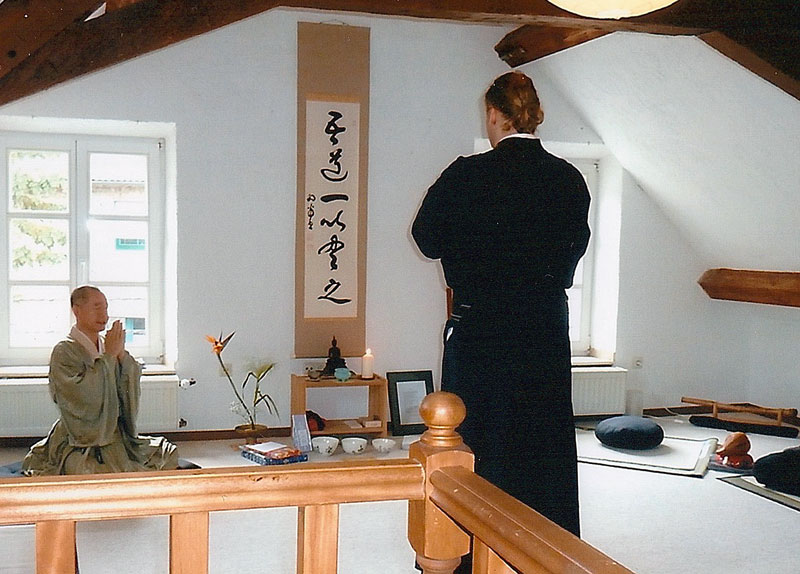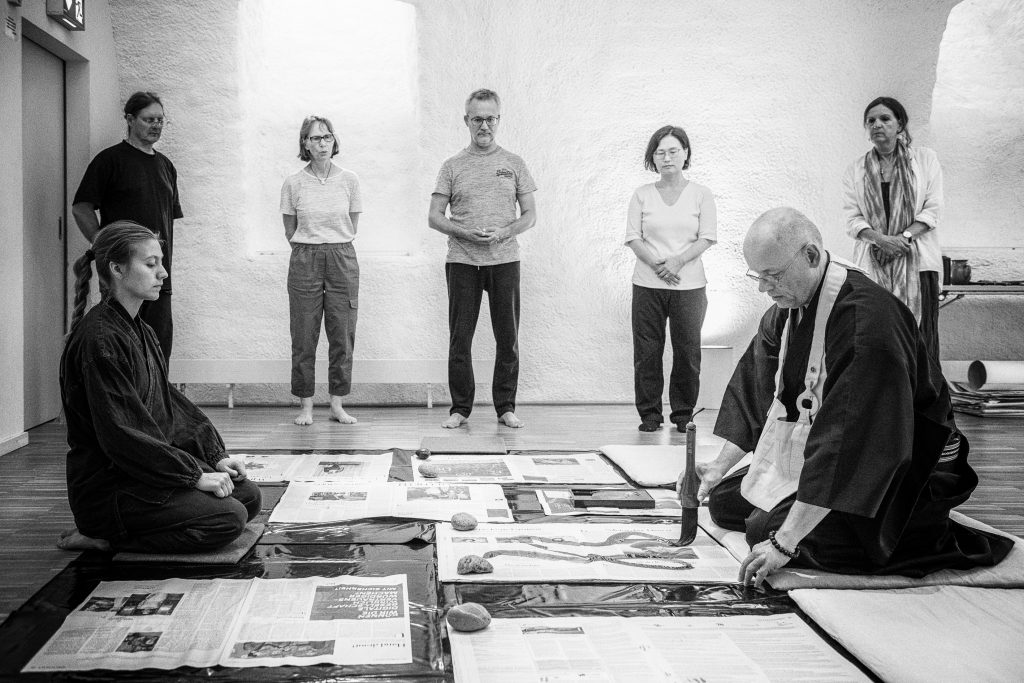After participating your first Sesshin, 5 days, 120 hours, where do you consider yourself? Already a “beginner”? Already on the Zen way? Already found your teacher and practice? I doubt.
I met my Zen teacher, with whom I worked for over 13 years, did almost 50 Sesshin, when I already was teaching Aikido at my own Dojo, offering regular Zen class (for which I mistakenly felt qualified after practicing half a decade with this or that group). It took me two or three Sesshin with this teacher to realise that I was actually a beginner, not an advanced student of any sorts. After five or six years close collaboration he made me his assistant, and after about 10 years we were teaching together.
More than twenty years after my first experience practicing Zazen I opened my Zen Dojo. The opening ceremony was conducted by my teacher, who gave the Dojo (and me) a Japanese name on that occasion. I received three bowls and a certificate from him that I am permitted to teach Zen and Hitsuzendo (Zen calligraphy). I remember, the first thing I did after officially becoming a “Zen teacher” was cooking noodles for all my guests.
I know who my teacher’s teacher was, and his teacher’s teacher. After parting from my teacher, I went to study with his senior colleague in Japan, Gensho Hozumi Roshi (who later “adopted” me in the Zen tradition and gave me the name “Genko”). Similar to this Zen lineage, I can draft where my late Aikido teacher came from, or my late Shakuhachi teacher. What I am doing at my Dojo is not some kind of home brew Yoga-Zen-Esoteric stuff, maybe after reading a few books or watching a few youtube videos, or spending some short (online) time with this or that self acclaimed “master”. It is totally transparent from where it all comes, and my addition is almost negligible.
I don’t much like social media, it keeps people away from meeting in person. But hiding my Dojo too well, I was convinced by my students, is no good idea either. So this blog exists, more or less, and a page on Instagram I occasionally update. Through this, I came about a (German language) advertisement with the title “Education: Zen-Teacher”. A program is offered, that for enormous 2.800 Euro qualifies one to teach Zen after 120-200 hours of training. Alas, not much can be found about the teacher’s qualification who is conducting the program, except that he calls himself “Sifu”, which is not quite any title known in the Zen world.
Why do such things exist? I am not interested in the particular case (that is why I even don’t provide a link here), or this or that person, if he or she exists, who invests such a great amount of cash. What interests me is the phenomenon as such.
For example, you would not find a similar advert for “becoming a violin teacher in 120-200 hours”, or “becoming a professor in quantum physics in 120-200 hours”. Why do some people believe, teaching Zen is such an easy skill to learn?
If you ask a seasoned Zen practitioner or head of a Dojo, he or she might probably even let you know that it is impossible to teach Zen at all. I tend to subscribe to that position, yet, with sufficient experience and empathy, you can be a certain help for dedicated people trying to discover their very own Zen way. Hopefully. At least, I can confirm that I benefited a lot form the guidance given by my teachers.
With my closest student I spent about 1.500-2.000 hours in total after she first entered my Dojo almost four years ago. If you’d ask her if she feels qualified to perform as a Zen teacher, she would probably laugh.
Do I myself feel qualified as a teacher, after almost 30 years of practice? Often I wonder. Possibly not so much. I consider myself as a borderline case: with a fascinating and profound practice to share, but very little pedagogical enthusiasm to drive someone else in a certain direction. The more you invest in your study with me, the more you might get back. But there is no “program” to join, nothing.
“There isn’t even a menu outside !” a passer-by complained after I opened my Dojo, probably mistaking it for an Asian restaurant. I like that: we don’t have a menu to order from. But you get a chance to learn how to prepare your very own Zen dish at our Dojo. It’s not McZen.


